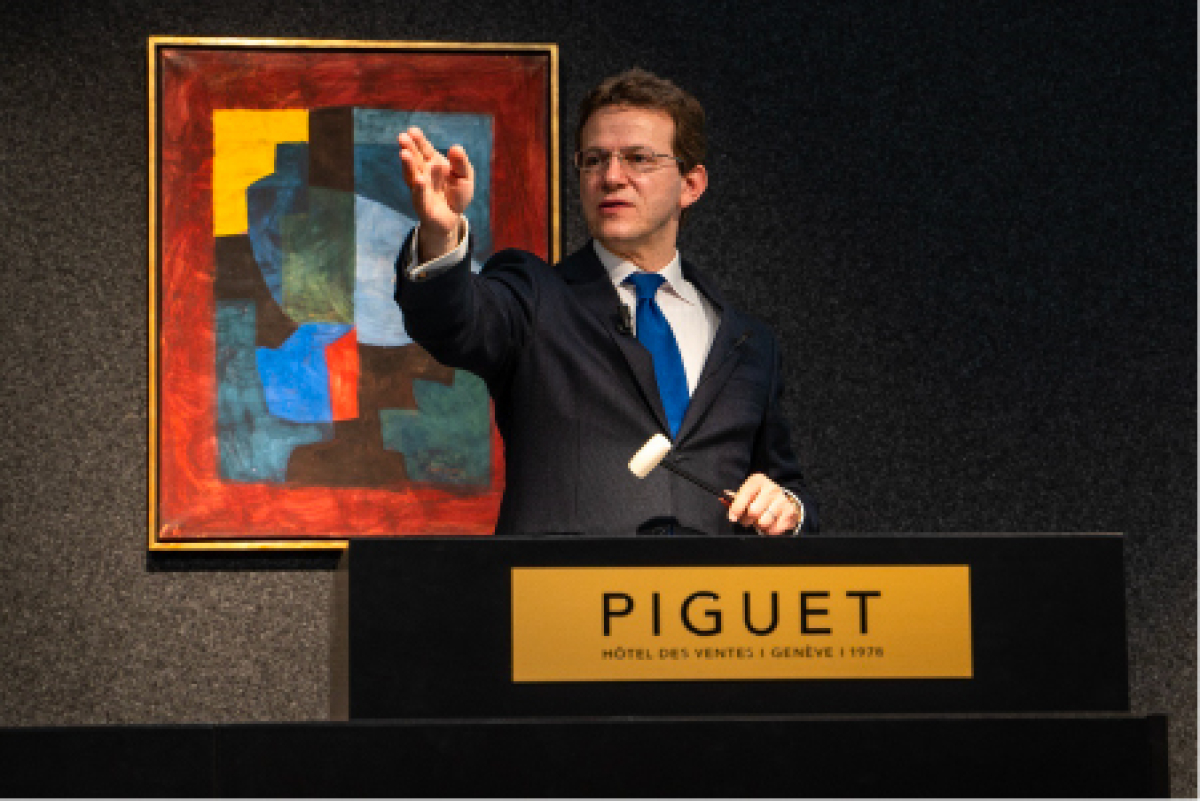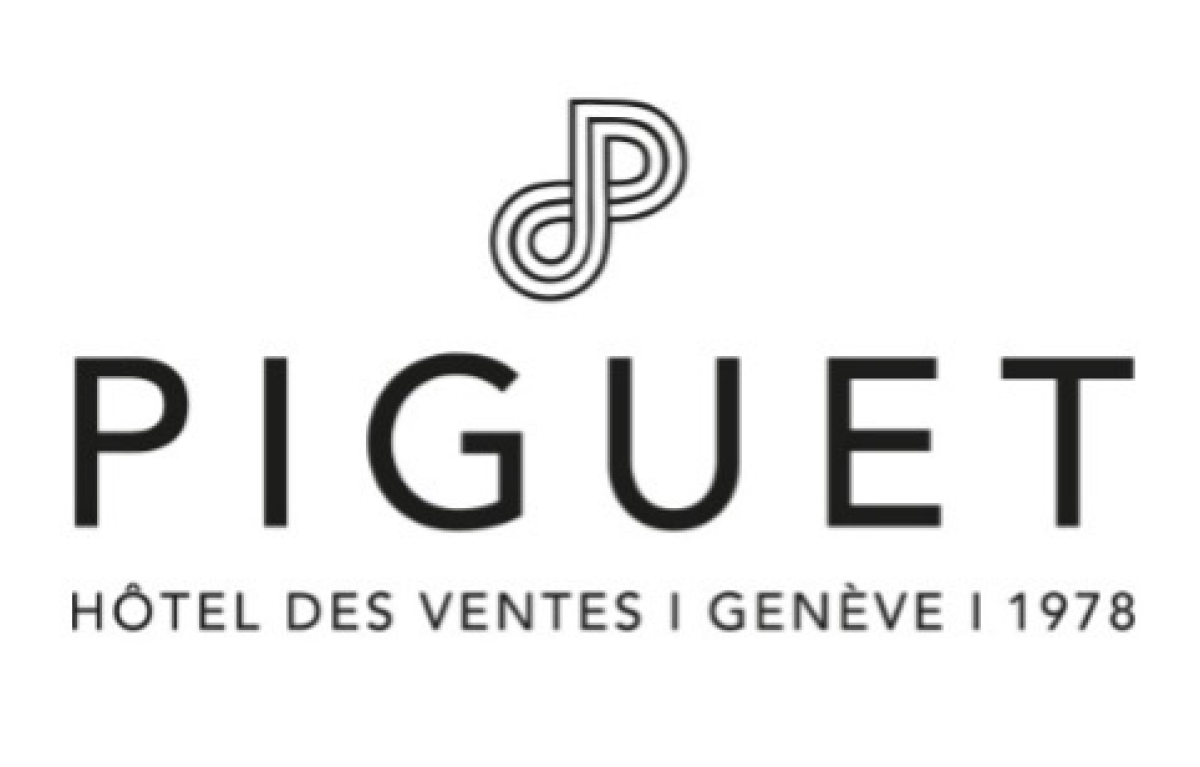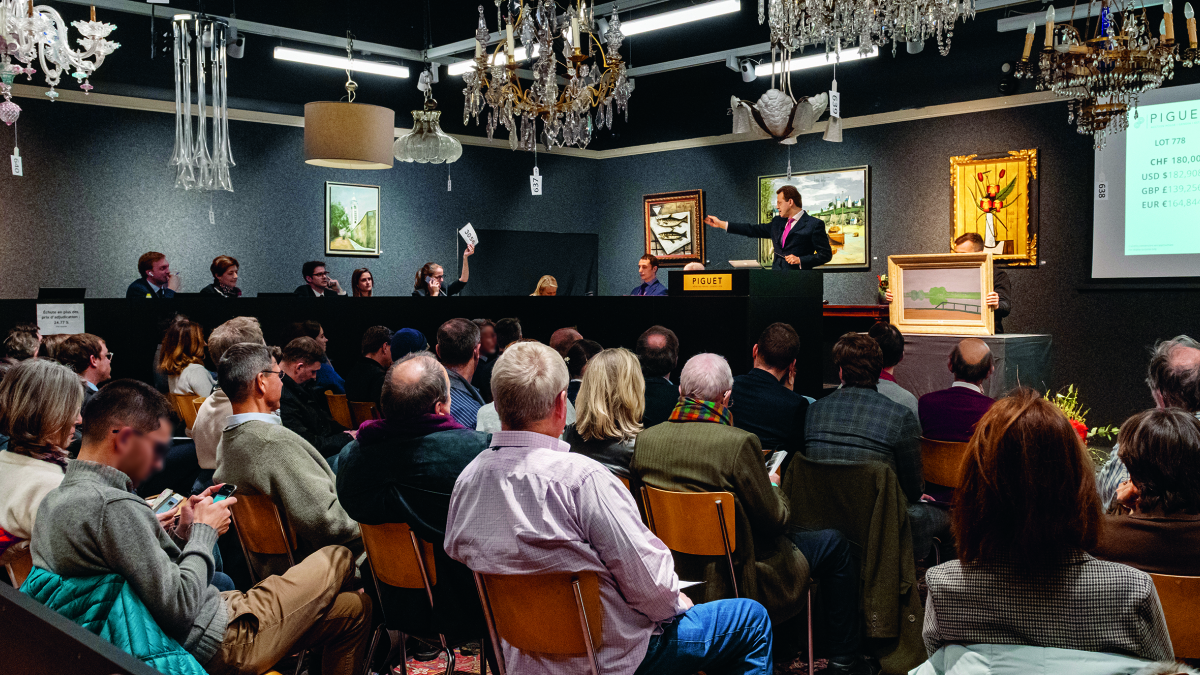10.12.2022
Special Report 95 > Future of Work: the Skills of Tomorrow.
The future of work in the world of luxury - Interview of Bernard Piguet auctioneer
Bernard Piguet has been an auctioneer and the Director of the Hôtel des Ventes de Genève for more than 15 years. After studying economics at HEC Lausanne and obtaining a degree in art history at the Sotheby’s Institute in London, this Lausanne native spent 6 years at Sotheby’s in Geneva as Head of Sales and Administrator of the high-end jewelry department before taking over the Hôtel des Ventes which was on the verge of bankruptcy at the time. HEConomist was pleased to interview this man who has transformed his company into a major player in the auction business and who benefits from unrivalled experience in the auctioning business of art and luxury goods.
Interview with HEConomist
How do you see the luxury industry nowadays, in particular the auction sector?
I see the luxury industry as a flourishing industry. Luxury is doing well today and there are more and more people with high purchasing power. I see a kind of transfer of money from savings (capital) to goods that are used right away, including luxury goods. And nowadays people want to show a certain status. This is also observable in the auctioning sector. Brands are also becoming increasingly international, the Internet plays a big role in this, and allows us easy access to goods from another country for instance. Even if it is expensive, we are willing to pay so our consumption style has also become more rational and I would even say repetitive compared to the past. Luxury and art have similar buying processes even if they are not entirely the same.
In the next few years, what would you like to see change in this sector? And what would you like to see unchanged?
For me the luxury sector has evolved a lot in the last few years and I take it as it is. As an entrepreneur and actor in the auctioning business, I adapt my business to the current situation. So for me it's hard to say exactly what I would like to see change, because in my opinion the current situation is in a good state.
Since you started in this sector, what are the main differences and evolutions you have witnessed?
I have been in the auctioning business for a long time, 25 years already. I have noticed that there is a substantial disappearance of collectors. Nowadays, we have a younger group. Unlike before, young people now travel a lot and settle down here and there. As a result, we no longer have this concept of a collector absolutely wanting to find a unique piece that is missing from their collection. Previously, we would sell a collection and people bought what could complete their collection. Nowadays, that has disappeared and even if it still happens it is less frequent.
Nowadays we look for pieces which have a relationship with our lifestyle, and we also have this aspect of showing-off, that is to say there is a brand world, and the name of the brand plays an essential role, a great name is extremely important. By brand I also mean certain artists like Picasso or Andy Warhol who have become brands. This means that the history, the technique all play a role in the creation of the brand.
If we talk about brands and show-offs, we are dealing with people who don't necessarily want to put in too much effort but who still want to be seen. For example, if you have an Andy Warhol lithograph, because the work is known worldwide, it becomes a sign that is recognizable to everyone even to people with less artistic knowledge. The work’s brand is reflected in the price, for example Andy Warhol‘s famous Campbell Soup cans that are silk-screen prints made in many copies and which sell for tens of thousands of Francs, which was not the case a few years ago. So, we see that some art objects have also become factors of social recognition as identifiable products, just like the luxury objects best represented by Rolex, Audemars Piguet and Patek Philippe. This trend is perceptible by the fact that works made by famous painters such as Picasso but which do not have the recognizable characteristics expected of a work by this artist will have a much lower valuation, even if they are artistically more interesting.

What do you think of remote/online auctions? Do they have the same effect as traditional events? Do you think we will see more of the remote version in the future?
For the second part of the question, the future is now. The answer is clearly yes. For us, the numbers speak for themselves. We have four sale sessions a year, each with three thousand lots sold over one week. A few years ago there was another form of sale called the silent sale with objects of lesser quality that were put aside. So to summarize, we had a week of sales in traditional auction rooms, with a part of the sales in this other form of auctioning. We had about three quarters of the objects that went through the hall and one quarter that went through another form. In 2019, we had already noticed a trend of decreasing attendance in the hall because there was already the possibility of bidding remotely and directly through our partner’s websites. This trend is particularly noticeable for very specific sessions such as the sale of books or antique art. We had already prepared a way to do online sales, however when we tried in 2019 to push our clientele to bid remotely on our own website we were met with a lot of resistance. But according to my plans, and noticing that we had a younger clientele in the last two years, I had already planned in 2019 that from March 2020 onwards we would only do online sales. We did the exhibition as usual and then forced customers to bid online through our website. And the gathering ban in March 2020 was very timely as it came right after the exhibition. At the beginning of the pandemic everyone started to use the internet from home, it became a must even for older people. So we can say that the pandemic has benefited our business. We have been surprised by the success of remote sales, as well as by the growing effect of this craze with each subsequently organized session of online sales. Thus, in 2021, we achieved our record year in terms of turnover. This record comes from the fact that we had beautiful pieces and the price of the pieces increased greatly. It is also due to the fact that we had more than 500 new customers per sale. So, as of 2021 the ratio has been reversed, which means that we sell 90% of the objects online and 10% are auctioned in the traditional way. This has completely changed our strategy. The traditional sales are now only done in the evening, as if you were coming to have a party, to have a nice time with the feeling of playing a game and feeling the stress of the auctions. Similar to going to the theater.
The fact that we put many more objects online allows us to acquire an international clientele while removing the handicap of the time difference since the online sale lasts 10 days. The traditional sale’s inconvenience is that it is punctual, the customers must be present. We nevertheless maintain this type of sale for objects of greater value and those which are more emotional because the human aspect is important for these types of goods. We can therefore ask ourselves if the traditional sale will live on. We don't really know, but I hope so, I think it has its place, but probably in a diminished way compared to today.
For someone who wants to work in the luxury and art sector, what are the essential skills that they must have and that will still be necessary in 10-20 years?
For me it is above all necessary to have a passion for one's work, one must be able to love what one does, that's how one becomes better. If it is merely a job done for a paycheck, it will not go very far. You need passion, but that's not enough, you need to have a deep knowledge of the field you're going into. If for example you are passionate about handbags and you want to be active in the handbag business, you obviously have to love what you do in the first place and thanks to the fact that you love your business you will always become better. You will not only know the brands but you will also get to know the manufacturing process of the products and therefore expand your knowledge. Another important aspect is also professionalism, for a more long-term vision, I think that nowadays you really have to adapt, you have to have this ability to adjust to new trends and new lifestyles. So to be at the top, you need passion, professionalism and the ability to adapt. Also when you're dealing with customers you have to have empathy to be able to give them the service they want. These are general skills that do not only apply to the world of luxury and art.
In 10-20 years, what differences do you think we will see in the luxury sector and the auctioning sector? (Positive or negative)
10-20 years is hard to predict for me, it seems like forever. In the current context it becomes difficult to look that far ahead. When we see how quickly, even before the pandemic, our lifestyles have changed, with the cell phone for example, all of this influences our thoughts, our way of being, our way of living. So for me now we should no longer think in terms of ten years, we should think in terms of two to three years. The future as far as the coming years are concerned, we can imagine it either with an even greater presence of luxury brands evolving in a refined universe where their name is recognized by everyone, or that the external constraints force us to have a return to a slightly simpler life. It's not necessarily a matter of runaway growth. Maybe in a few years all these markers of wealth will not have the same importance which will perhaps lead us to a life a little closer to nature, being more aware of climate problems, of the problems that we are talking about today. Maybe circumstances will make us turn away from this luxury little by little. For the moment there are always more brands, but if we take a 10-year objective, maybe that will change. In relation to auctions, it is a way of commerce that is more and more widespread now. It's less scary than it used to be. In 15 years of involvement in the auction house, I have always democratized auctions because I think they concern everyone. Therfore the evolution of the future of auctions in my opinion will happen thanks to the fact that there will always be more room for new auctions, it is a sector that is not going to die, but rather is expanding. Furthermore, auctions will have to be more and more focused on customer service, meaning that there is the object that we buy, but first we must know what we buy and therefore we need a quality service. This service is also needed after the sale because if you let the customer down once they have bought and paid for an object they will not be happy. The model where the customer buys something abroad and has to pay for the transport still exists in many companies and this is a point which needs improving upon as it is no longer in line with the current market where it is necessary to have an ever more comprehensive service.



